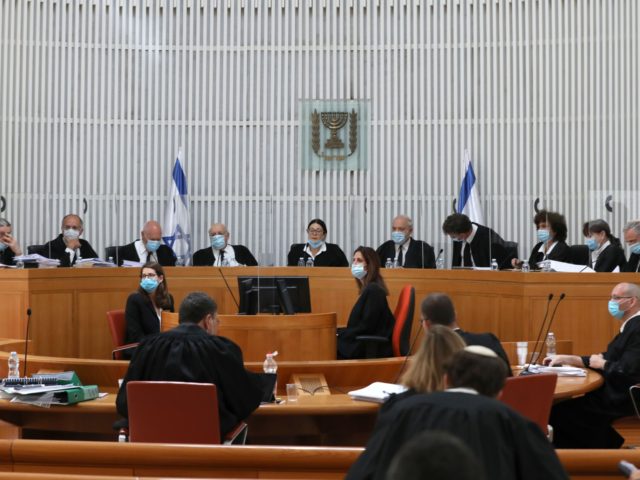While the imminent dissolution of Israel’s Knesset was keeping the country on tenterhooks Tuesday, another smaller, but arguably no less significant, development was taking place in its Supreme Court. For the first time ever, the court debated the legality of a Basic Law — essentially challenging its own constitution — in a move that has been denounced as the “quiet death of democracy.”
The court held a hearing to discuss the so-called Nation-State legislation, a Basic Law that amounts to a constitutional one — bearing in mind that Israel is a country without a written constitution. The Nation-State Law, passed in 2018, was a controversial measure to enshrine Israel as the nation state of the Jewish people.
Prime Minister Benjamin Netanyahu in a statement slammed the move, saying the court has “no authority to judge the authority of Basic Laws, as Basic Laws enacted by the Knesset are the supreme law of the land.”
Protesters outside the hearing chanted, “We elected Netanyahu, not [Chief Justice Esther] Hayut.”
The simple act of even discussing striking down a Basic Law, critics posit, is calling into question the right of Israeli citizens to maintain democratic autonomy and decide their own basic values — instead handing that mandate over the court and making it the highest power in the land.
Even Attorney General Avichai Mandelblit, who filed an indictment against Netanyahu on corruption charges, has been vocal about his opposition to the court’s decision to hold the hearing.
Writing in The Tablet, preeminent legal scholar Eugene Kontorovich claims the Nation-State Law, with its emphasis on the Jewish character of the state, “was anathema to the [Supreme Court] justices’ cosmopolitan worldview.”
Kontorovich, a law professor who serves as the director of the Center for the Middle East and International Law at George Mason University Scalia Law School, writes:
By agreeing to hear such challenges, the court is suggesting that while Basic Laws are enacted through the sovereign power of the people, there is some law even higher than these Basic Laws. And the only body with the authority to determine the contents of the invisible “higher law” is the court itself. In other words, since according to the court, such Basic Laws constitute Israel’s patchwork constitution, the court believes that it has the power to strike down the constitution as unconstitutional.
In a landmark 1995 case known as the Mizrahi Bank ruling, the Supreme Court informed Israelis that indeed, they have a constitution.
It was later described by former Chief Justice Aharon Barak as a “constitutional revolution” that came from the people. (Now, Kontorovich explains, faced with Basic Laws he does not like, Barak is attempting to turn Israel’s Declaration of Independence — a political document that like its American counterpart was never voted on by the people — into a constitutional arbiter, affording the court a mandate to strike down laws, even Basic Laws).
“Today the Supreme court is hearing a case about whether parts of the Israeli constitution are legal, that means the supreme court has set itself up to have the authority to throw out parts of the constitution as being against some higher law that doesn’t stem from the people and about whose existence only they know,” Kontorovich told Breitbart News.
He went on to note that while the court will probably hold that Basic Law in question is in fact constitutional, it will have already set a precedent by establishing itself the power to decide to strike down whatever parts of the the constitution it doesn’t like in the future.
“Such a practice does not exist in any Western democracy and makes the Supreme Court the supreme power in the land,” he said.
“This is the quiet death of Israeli democracy,” he added.
Follow @danandeborah on Twitter

COMMENTS
Please let us know if you're having issues with commenting.